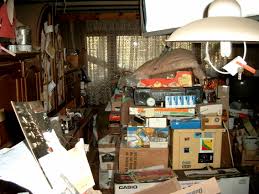
There is a clutter and then there is CLUTTER with a capital C.
No matter where your household lands, clutter gets in the way. And I am not just talking about tripping over a few items or slamming your elbow into a pile of junk. I am talking about the clutter that accumulates and creates tension in your home. Tension in the home leads to arguments, anxiety, depression, and insomnia.
Psychologist Sherrie Bourg Carter explains; “Clutter can play a significant role in how we feel about our homes, our workplaces, and ourselves. Messy homes and workspaces leave us feeling anxious, helpless, and overwhelmed. Yet, rarely is clutter recognized as a significant source of stress in our lives.”
As Carter states, it is not just our homes. Our workspace and ourselves should be a clutter-free zone as well in order to live in peace and sleep in a healthy environment. So what does clutter-free living look like? It is the opposite of sighing when you walk in your home or office. It is the opposite of feeling in the pit of your stomach an overwhelming urge to move or throw it all out. With some practical simple tips, you can begin the life of a clutter-free environment.
Start with organizing items in piles.
 If you never joined the bandwagon of Marie Kondo’s Spark Joy renaissance, circle back to Netflix and stream “Tidying Up with Marie Kondo” now. The exercise of starting with items that bring you joy will help you prioritize the clutter in your life. What is a joyful item or thing? Kondo explains it in her show as the KonMari Method™:
If you never joined the bandwagon of Marie Kondo’s Spark Joy renaissance, circle back to Netflix and stream “Tidying Up with Marie Kondo” now. The exercise of starting with items that bring you joy will help you prioritize the clutter in your life. What is a joyful item or thing? Kondo explains it in her show as the KonMari Method™:“Focusing on what to discard obscures the most important part: choosing what to keep. Minimalism champions living with less, but Marie’s tidying method encourages living with items you truly cherish.”
By surrounding your home and workplace with items you cherish that bring meaning and importance, it motivates you to keep a decluttered life. A decluttered life brings simplicity and simplicity brings relaxation. I think you get where this is going: by decluttering you are clearing the mind of the visible baggage surrounding your life.
Getting organized is not done alone.
Your partner or spouse and children are important factors to keep in mind when decluttering. It doesn’t mean everyone is on board at the beginning since decluttering takes a lot of work, but in the dead of winter, it is the perfect place to begin. Look at magazines and post some pictures of serene, calming spaces. This is what you can aspire to as a family unit.
Create easy wins. Start with one corner of a room or one room depending on the amount of clutter. Don’t empty closets at the beginning. Stick with what can be donated, what sparks joy, and what can be shifted to a space the item rests.
Purchase baskets and bins. A visit to the Dollar Tree or Walmart will prove to be huge wins in the organization front. Early in the decluttering, you are not looking for the perfect look: go with the cheap and functional organizers. Later these less expensive organizers can be used in a closet.
Assign tasks. Put on some music and have fun with the tasks of the day. Grab a basket per family member and make it a game. Toys, clothes, books, paper, trash, etc. can be easily labeled on each basket. You might even consider purchasing at a dollar store cheap dish cleaning bins. They are large and can accommodate the load.
Donate clothes. There is a trick with clothes to turn your hangers on January 1 to the opposite direction on the rack so after you wear an item, you turn the hanger back around. It can help each season to then remove the clothes that never made the cut to a shelter or Goodwill.
Oil up. Once your space becomes decluttered, purchase an air purifier for the space and a diffuser. The air will filter and replace with sweet aromas. Purchase lavender for the bedrooms to help trigger the mind to a calm sleep.
Hire a maid. You may not have the means to hire a weekly or monthly maid. But to start with some successful takeaways for the family, bringing in a maid or housekeeping crew can help create shortcuts to keep the space clean and manageable.
Scour Pinterest. Pinterest can be an excellent resource to find easy home projects to maximize space in closets and tight spots. With less than 1,200 square feet and tiny closets in our home, solutions found by others can be a win-win and an affordable option to become organized.
By removing the guilt you feel about being unorganized and seeing progress around the house, your mind will be clear and insomnia will begin to dissipate in a calming space. A lot of clutter also could lead to a lot of dust causing allergy issues, headaches, or other health problems.
People at risk of hoarding disorder may have serious complaints about sleep
A new study suggests that those at risk of hoarding disorder may have serious complaints about sleep.
Results show that participants at risk of hoarding disorder scored significantly higher on the Sleep Habits Survey (SH) and on three sub-scales of the Pittsburgh Sleep Quality Index (PSQI), including sleep latency; sleep disturbances and daytime disturbances.
“Hoarders typically have problems with decision making and executive function; poor sleep is known to compromise cognition generally, so if hoarders have cluttered/unusable bedrooms (and less comfortable, functional beds), any existing risk for cognitive dysfunction, depression and stress may increase as sleep quality worsens,” said lead author Pamela Thacher, assistant professor of psychology at St. Lawrence University in Canton, N.Y.
The research abstract was published recently in an online supplement of the journal Sleep.
Although decluttering may not be the immediate answer to your sleeping woes, the Alaska Sleep Clinic can be the next step.
In Soldotna… In Wasilla… In Fairbanks… In Anchorage…
@ 907-420-0540 @ 907-357-6700 @ 907-374-3063
@ 907-770-9104












